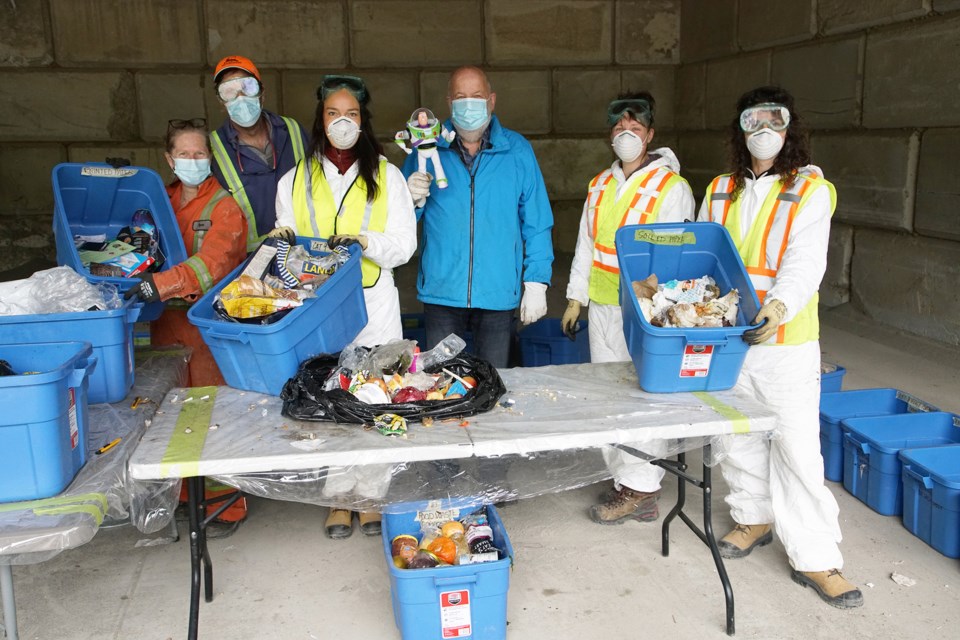With Waste Reduction Week in Canada being October 21 to 27 this year, residents can take many measures to reduce the amount of garbage being barged out of the qathet region.
Let’s Talk Trash environmental consultant Ingalisa Burns said there’s no bad time to reduce waste and consumption, but Waste Reduction Week is a fantastic time to reduce waste as a community, and for getting other people onboard.
Burns said she had three top tips for the week, with the first suggestion being not creating waste in the first place. A reusable to-go kit for food items is a great idea, she added.
“What I mean by that is, bring your own items,” said Burns. “Perhaps people are bringing their own water bottles, but there are many people who are not bringing their own reusable utensil kits, or items like a tiffin, which is a metal, sealable container, which is very easy to sanitize and rinse out. Or, people can use Pyrex glass containers with a very solid, sealable lid.
“So just having that with you is a great way to take out the takeout containers from your waste stream because you don’t consume them in the first place.”
Burns said in some larger centres, food services such as delis and restaurants that do delivery services are now offering, instead of single-use takeout containers, the option for reusable containers.
“So, it’s definitely a trend and it is a discussion that has happened in our region,” said Burns. “It’s just not yet here but it is a really great idea. In the meantime, we can do it ourselves.”
Burns said it’s great that some local event organizers have encouraged patrons to bring their own reusable to-go kits and make a huge difference in the container waste that is generated.
“It’s great to see event organizers encouraging that,” said Burns. “It’s really nice to create a little bit of positive peer awareness. If you do end up, for waste reduction week, creating your own little kit, then maybe take a photo of it and post it, if you’re a social media person, or tell your neighbours and friends. That kind of public commitment is a great way to make your impact extend beyond your household.”
Another tip Burns offered is regarding organic, or compostable materials. She said in City of Powell River, there is now curbside organics pickup. She added that organics constitute about 40 per cent of the garbage produced here. That figure was arrived at through a waste audit process that Let’s Talk Trash has participated in.
“We have definitely put on personal protective equipment and gotten right into the waste that was collected over the period of a week within the municipality,” said Burns.
She said in terms of organics being an animal attractant, a nice tip is to freeze the particularly odorous material until collection day and then dump it into the curbside bin prior to pickup.
“That greatly reduces the risk of any kind of attraction, then rinsing out the organics bin is also a good idea,” said Burns.
She added that to make cleanup of bins easier, it is a good idea to line the bottom of the bin with cardboard because “it absorbs any goo.”
“It’s fine to add cardboard,” said Burns. “It gets blended into the material to create soil.”
Burns reminded residents that yard and garden waste is compostable, and now is the time of year when people are doing fall cleanup of their properties.
“All that is accepted at curbside,” said Burns.
For those living outside the city in qathet Regional District electoral areas, or even in the city, there is the prospect of backyard composting. Burns said organics are also accepted at the Town Centre Recycling Depot, which will be moved to the new resource-recovery centre. Sunshine Disposal on Franklin Avenue also takes compostable materials, up to two yards, she added.
The final tip Burns offered is the prospect of fixing broken items rather than throwing them into landfill when they stop working. She said if items can be repaired, it ends up reducing waste. A good resource for getting help with repairs is the website ifixit.com, which Burns called a good online resource.
“The website has a whole bunch of step-by-step guides,” said Burns. “This is all free of charge. They promote the notion that you don’t need to be able to fix everything, but everyone can fix something. This particular site gives tips for some of the most commonly broken items, such as phones, vacuums, laptops, dishwashers and coffee makers.”
Burns said there’s also the opportunity for people to help each other. For example, people could have others repair a bicycle and offer to fix torn clothing in exchange.
She said some communities are starting to offer something called a repair café, which brings in people who are experts in repair, and they often volunteer their time to divert items from landfill.
“It’s just this really beautiful exchange within the community,” said Burns. “I would love to see that happen locally. It would be a fantastic service for the community.”
Burns said that Waste Reduction Week is an opportunity to create a groundswell, where items are made, used, then reused, or repaired, or recycled or composted.
“It’s a more natural way to look at resources,” said Burns.
Join the Peak’s email list for the top headlines right in your inbox Monday to Friday.




